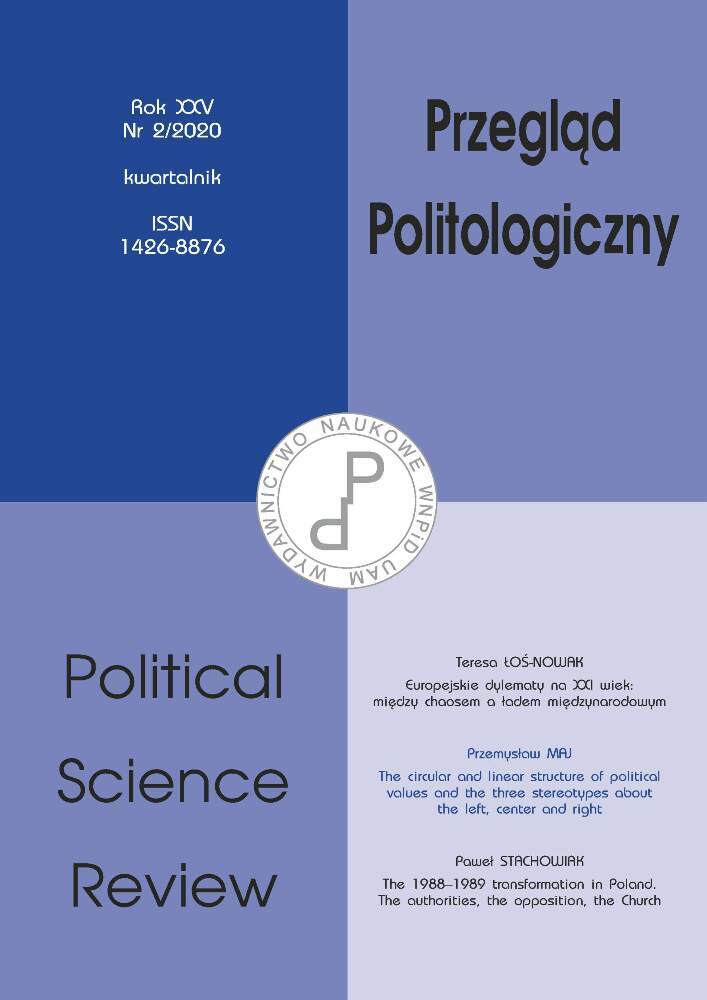Abstract
The aim of the article is to give arguments against the presence of three stereotypes in political science concerning leftism, centrism and rightism. The first one involves the classification of political entities by indicating their place on the left-centre-right axis. The second is based on the belief that leftism, centrism and rightism can be narrowed down to specific levels of competition (e.g. views on the economy or religion). The third stereotype is “dogma” that the conflict over political values was initiated during the French Revolution. The author explains his position with reference to the psychological theory of Shalom H. Schwartz and the circular matrix of meta-value.
References
Bobbio N. (1996), Left and Right. The Significance of a Political Distinction, The University of Chicago Press, Chicago.
Cieciuch J. (2013), Kształtowanie się systemu wartości od dzieciństwa do wczesnej dorosłości, Liberi Libri Publishing House.
Cieciuch J., Schwartz S. H. (2017), Values, in: Encyclopedia of Personality and Individual Differences, eds. V. Zeigler-Hill, T. K. Shackelford, Springer International Publishing, Cham, pp. 1–5.
Dingeldey I. (2007), Between workfare and enablement–The different paths to transformation of the welfare state: A comparative analysis of activating labour market policies, “European Journal of Political Research” 46 (6), pp. 823–851.
Downs A. (1957), An Economic Theory of Political Action in a Democracy, “Journal of Political Economy” 65(2), pp. 142–145.
Gallagher M., Laver M., Mair P. (2011), Representative government in modern Europe, McGraw-Hill.
Harmel R., Svåsand L. (1993), Party leadership and party institutionalisation: Three phases of development, “West European Politics” 16(2), pp. 67–88.
Huntington S. P. (1996), The clash of civilizations and the remaking of world order, Simon and Schuster, New York.
Inglehart R. (2007), Postmaterialist values and the shift from survival to self-expression values. The Oxford handbook of political behavior, Oxford University Press, Oxford.
Kitschelt H. (1992), The formation of party systems in East Central Europe, “Politics & Society” 20(1), pp. 7–50.
Klotz R. J. (2004), The politics of Internet communication, Rowman & Littlefield, Lanham.
Lipset S. M., Rokkan S. (1967), Cleavage Structure, Party Systems, and Voter Alignments: An Introduction, in: Party systems and voter alignments: Cross-national perspectives, eds. S. M. Lipset, S. Rokkan, Free Press, New York.
Maj P. (2018), Lewicowość, centrowość i prawicowość w nauce o polityce [Leftism, centrism and rightism in political science] (in Polish), Rzeszów University Press, Rzeszów.
Mudde C. (1999), The single-issue party thesis: Extreme right parties and the immigration issue, “West European Politics” 22(3), pp. 182–197.
Reedy W. J. (1981), Burke and Bonald: Paradigms of Late Eighteenth-Century Conservatism, “Historical Reflections / Réflexions Historiques” 8(2), pp. 69–93.
Reykowski J. ( 2011), Trzecia Rzeczpospolita a lewica, in: Projekt dla Polski. Perspektywa lewicowa, ed. J. Reykowski, Warszawa.
Routamaa V., Brandt T. (2008), Understanding Cultural Differences The Values in a Cross-Cultural Context, “International Review of Business Research Papers” 4(5), pp. 129–137.
Schwartz S. H. (1992), Universals in the Content and Structure of Values: Theoretical Advances and Empirical Tests in 20 Countries, in: Advances in Experimental Social Psychology, ed. M. P. Zanna, New York Academic Press, New York, pp. 1–65.
Schwartz S. H., Cieciuch J., Vecchione M., et al. (2012), Refining the theory of basic individual values, “Journal of personality and social psychology” 103(4), pp. 663.
Scruton R. (2002), Co znaczy konserwatyzm?, Zysk, Poznań.
Singer M. G. (1954), The Categorical Imperative, “The Philosophical Review” 63(4), pp. 577–591.
Torres C. V., Schwartz S. H., Nascimento T. G. (2016), The Refined Theory of Values: associations with behavior and evidences of discriminative and predictive validity, “Psicologia USP” 27(2), pp. 341–356.
Wendelken D. (1996), Contemporary Conservatism, Human Nature, and Identity: The Philosophy of Roger Scruton, “Politics” 16(1), pp. 17–22.

